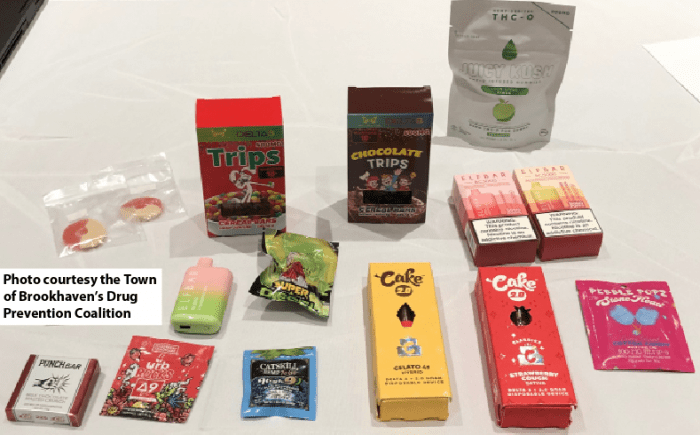Brookhaven officials joined Suffolk County District Attorney Ray Tierney (R) and drug prevention advocates outside Town Hall in Farmingville on Thursday, Aug. 31, to mark the beginning of Opioid Awareness Month.
Several of those present donned purple ribbons as officials called for more urgent intervention on behalf of government.
We “are here today to call attention to the overdose [deaths] that are permeating our county, our state and our country,” said Town of Brookhaven Supervisor Ed Romaine (R), candidate for Suffolk County executive with Dave Calone (D). “We have to have better treatment facilities, we have to help out and reach out to those afflicted and those addicted, and we have to stop the flow of fentanyl into this country.”
Tierney said minimizing opioid deaths is a matter of effective prosecution. “We need to make fentanyl a bailable offense,” the county DA said. “We could only ask for bail if you possess eight ounces of fentanyl, which is about enough fentanyl to kill 114,000 people.”
Brookhaven Deputy Supervisor Dan Panico (R-Manorville), a candidate for town supervisor against SUNY Old Westbury adjunct professor Lillian Clayman (D), condemned the New York State government for passing measures that, according to him, exacerbate the opioid problem.
“Our state government now tries to balance its budget on tax revenue coming from things that lead to addiction,” he said. “They’ve promulgated rules and taxes on marijuana — which is a gateway [drug] — gambling, online gambling. These also compound and lead to addiction.”
The deputy supervisor continued, “We need a shift not only in our society but our government because these are human beings.”
Drew Scott, former newscaster from News 12 who has lost a granddaughter to opioids, attended the press event, reminding policymakers and community members that “addiction is a disease” and that “one pill can kill.”
“Curiosity can kill young people,” he said. “Just one pill at a party out of curiosity has killed so many of our young people.” He also urged others to “please, join the crusade and do something about overdose awareness and fentanyl. And fight, fight, fight.”
Town Councilman Michael Loguercio (R-Ridge), who has lost two nephews to opioids, called upon the state Legislature to require insurance companies to pay for treatment.
State law “should require insurance companies to pay for treatment — not only pay for the emergency room visit when we bring them in but pay for the treatment,” the councilman said. “Please, speak to your New York State Assembly [members] and senators, and get them to legislate requirements for the insurance companies to treat these people with the treatment that they need.”
Councilmember Jonathan Kornreich (D-Stony Brook) recognized his Council District’s Drug Prevention Coalition. He advocated for expanding this initiative townwide.
The coalition is “a hyperlocal model of deep engagement through community organizations, local businesses, chambers of commerce, civic associations and working closely with the school districts … to raise awareness, reduce the stigma, and it’s having an impact,” he said. “These are very fine people who are working very hard today and have produced a model that can be replicated all over the town.”






